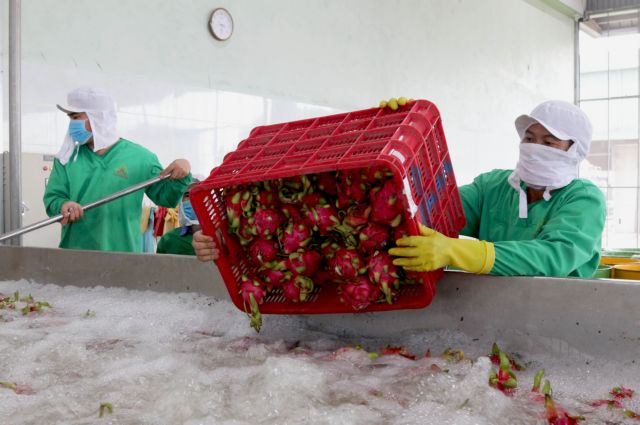 Economy
Economy


|
| Dragon fruits processed at a plant of Nafoods Group in Long An Province. Việt Nam's agro-forestry-fishery exports totalled $5.3 billion in the first two months of this year. - VNA/VNS Photo Bùi Giang |
HÀ NỘI Việt Nam exported agro-forestry-fishery products worth a total of US$5.3 billion in the first two months of this year, representing a slight drop of 2.8 per cent against the same period in 2019, updates from the Ministry of Agriculture and Rural Development showed.
In February alone, agro-forestry-fishery exports were estimated at $2.57 billion, up by 33.6 per cent over the same month in 2019, but falling by 7 per cent against January.
Some products saw increases in both export volume and value over the same period last year. Rice export reached 890,000 tonnes (up 27 per cent), worth $410 million (up 33 per cent). Cassava export was estimated at 130,000 tonnes (up 40 per cent), worth $27 million (up 70 per cent).
Meanwhile, exports of tra fish, cashew, rubber, and fruit and vegetable decreased, partly due to difficulties in exporting to China amid the outbreak of the novel coronavirus (COVID-19).
Việt Nam’s agro-forestry-fishery imports totalled $4.3 billion in January-February, decreasing by 6.7 per cent.
According to the ministry, the agriculture sector faced a number of challenges in the first two months of this year. The COVID-19 epidemic was heavily affecting agricultural production and exports, drought and salinisation hitting southern provinces hard while African swine fever caused a severe shortage of pork.
Minister of Agriculture and Rural Development Nguyễn Xuân Cường said the ministry focused on restructuring agricultural production, expanding and diversifying exports markets, improving processing and establishing value chains to cope with the difficulties. Negotiations to expand export markets would be strengthened together with improving product quality and solutions to approach retail systems and supermarket chains in foreign countries.
The ministry also put a close watch on the development of the COVID-19 epidemic and trade with China to develop measures, he said. VNS




